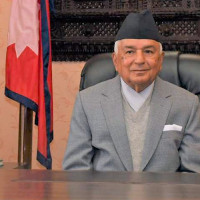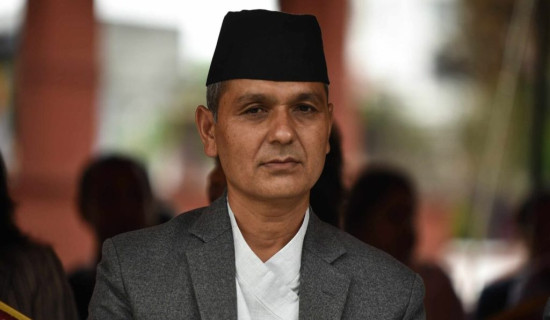- Thursday, 19 February 2026
A Wakeup Call For Parties
The massive protest, staged by Gen Zeers on September 8 and 9, has thoroughly exposed the shallow ideological foundation and a fragile support base of major political parties occupying the central stage of national politics for more than three decades. The way the most powerful coalition government in Nepal's history, comprising the ruling and opposition parties, came crumbling down within 24 hours of the protest, raises serious questions about the competence of political parties to act as the standard bearer of change in the future.
The present federal democratic republican system has been under severe strain ever since it was institutionalised with the promulgation of the constitution in 2015. The Madhes-based parties had burned down the copy of the constitution on the very day it was promulgated. Nepal's southern neighbour, India, had refused to recognise it. As a result, the pro-constitutional political parties had a tough time implementing it. Odds were heavy, but the implementation process of the constitution remained on track until three tiers of federal structure were put in place and elections held.
Power rivalry
During the past ten years, two general and two local-level elections have been held, bringing the post-constitutional transition to a logical conclusion. Unfortunately, however, the political parties dashed the popular expectations by engaging in power rivalry at the cost of democratic values both within the party organisations and in parliament. Driven by the greed for power, the parties formed unholy alliances with major or minor parties as per convenience to topple the party in the government instead of allowing it to complete its full term.
For a country like Nepal with a large population of working youths, building a sustainable economic base should have been the priority. However, the agriculture sector, on which 62 per cent of people still depend, was never prioritised. Nepal's other potentials, such as tourism, hydro electricity, cross-border trade and manufacturing sectors, which could create employment and generate revenue quickly, were ignored. Flashy projects like the international airports, tunnel road, and view towers, which could be of long-term benefit but would drain resources in the short term, were given priority. This generated dissatisfaction among the youths who desperately needed jobs.
High-profile corruption scandals involving ministers, judges, top-level bureaucrats and party elites raised serious questions about good governance. The controversies over wide-body purchase, a series of unresolved investigations into gold smuggling cases, commission commission-grabbing through policy-level corruption were swept under the carpet, further angering the youths.
Parties in power engaged in witch-hunting against emerging popular leaders like Rabi Lamichhane, leading to his imprisonment on the charge of embezzling a large sum of depositors' money from different cooperatives. Even courts appeared to act in tandem with parties in power when Lamichhane was repeatedly denied the freedom to defend himself while remaining free. The harsh treatment meted out to Lamichhane while hushing high-profile cases implicating former foreign minister Arzu Rana Deuba in the Bhutanese refugee scandal and former home minister Ramesh Lekhak in the visa episode clearly showed that the ruling coalition resorted to selective justice to defend its political turf from being challenged.
The generation of children (known as Gen Z), well-educated and equipped with all the skills to use social media, were watching. Gen Zeers are the sons and daughters of ordinary people and those of middle and lower level party leaders who had fought for democracy, arms in arms against monarchy, with the present day leaders in power but were sidelined or disgraced in the brutal race for power. These youths, growing up with a great dissatisfaction, were further provoked by the show of opulence and extravagance by the nepo-babies, children of the same leaders. All these circumstances must have acted in combination to prepare the objective condition for the outbreak of the revolt that we witnessed in Kathmandu last week.
In the already charged context, the misguided decision of the government to impose a ban on social media acted as the last straw for the youths who considered that the government was making their life difficult by divesting them of the only tool they had at their disposal for earning, learning and socialisation. The youths descended to the street in their thousands. They intended to project power and warn the government not to ignore the youths. They had clear instructions to avoid violence, arson and vandalism.
Geopolitical ambition
But as soon as they were in the street, their movement was hijacked by other actors ranging from domestic forces prowling for blood to foreign powers eager to dig a foothold in Nepal in pursuit of their geopolitical ambition. The extent of gruesome violence becomes clear from the fact that 70 plus people, including the nineteen youths shot by the police on the first day of the protest, lost their lives within 24 hours. The cost of arson and destruction inflicted on sensitive government institutions like the parliament, the central secretariat, ministries, provincial government offices, the Supreme Court, attorney general's office is incalculable.
To sum up, the Gen-Z movement has exposed serious chinks in the armour of political parties, highlighting the scale of their alienation and unpopularity. Political parties were, in fact, never as vulnerable as they are today. If they want to prove their relevance and resilience, they have to reinvent themselves. They can begin by fostering inner party democracy, open leadership positions at all levels to competitive meritocracy, yielding space for youths to rise through the hierarchy. It is time for them to start course correction - now or never!
(Dr. Bharadwaj is a former ambassador and former chairperson of Gorkhapatra Corporation. bharadwajnarad@gmail.com)
















